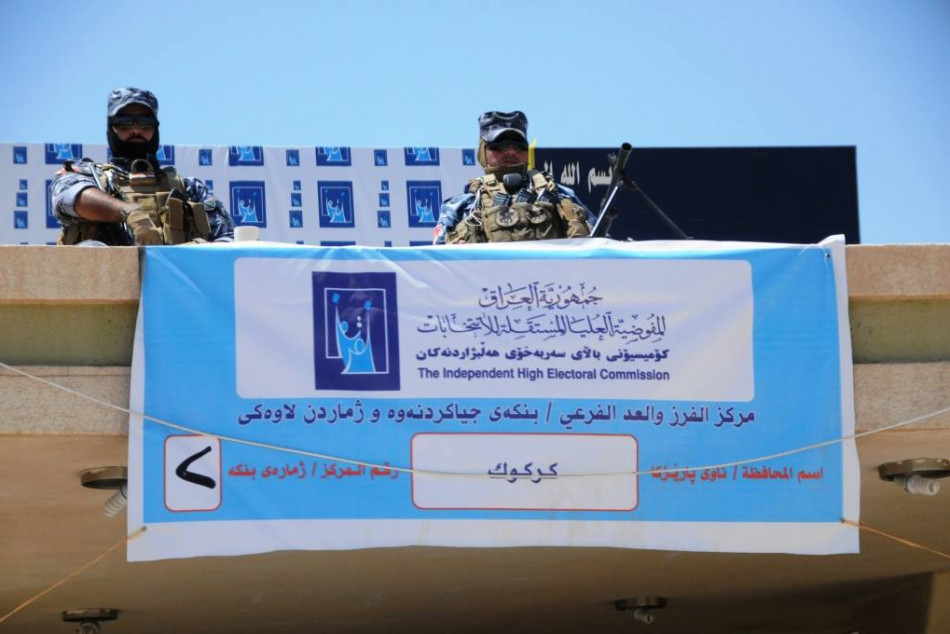The Iraqi Turkmen Front ITF and the Arab Council reject the last changes in the senior positions of Kirkuk office for the Independent High Electoral Commission IHEC and call for immediate revocation.
The Arabs and Turkmens declared their rejection in a joint press conference on June 6th in Kirkuk.
Hatam al-Ta'i, spokesperson for the Arab Council in Kirkuk, declared the joint statement in a press conference attended by KirkukNow correspondent. He described the current changes in the Kirkuk office of IHEC as "clear violation of the constitution" which made them hopeless.
On June 2nd, the IHEC made a series of changes in Kirkuk, a copy of the letter obtained by KirkukNow.
"These changes are a step to bold our doubts about integrity of the elections."
Director of IHEC in Kirkuk was replaced, beside managers for the departments of media, registry of voters, training, services, parties and candidate affairs, finance, law and administration.
"These changes are a step to bold our doubts about integrity and transparency of the upcoming elections," the joint statement said.
Iraqi parliament early elections are due on October 10th.
The new electoral law ratified last November, a key demand of October 2019 demonstrators, changes each of the country’s 18 provinces into several electoral districts in order to prevent parties from running on unified lists, which has in the past helped them easily take all the seats in a specific province. Instead, the seats would go to whoever gets the most votes in the electoral districts.
The 329-member house of representatives was elected in May 2018. The vote is held every four years, but the protesters have been demanding early elections. The 12 seats of Kirkuk Northern Province are divided over three electoral districts.
Footage of the joint press conference by Arab Council and ITF in Kirkuk.
"It's unacceptable for one component to keep the administration of IHEC and its senior position," Al-Ta'i said in the press conference. "Role of Arabs and Turkmens is marginalized."
Kurds were holding the position of IHEC director in the last rounds. Arabs and Turkmens always accuse the Kurds of fraud in elections as the Kurds were holding grip over power in the oil-rich city up to 2017 when Iraqi troops ousted the Kurdish forces following declaration of victory over the Islamic State in Iraq and Syria ISIS.
Back in 2020, The Arab and Turkmen parties in Kirkuk rejected appointment of Sawsan Tayib as director of IHEC Kirkuk office, accusing her of involvement in 2018 parliamentary elections fraud in Kirkuk in favor of a political party.
The Arab political council and Iraqi Turkmen Front ITF, each got 3 seats out of 12 in 2018 parliamentary elections, accused the Patriotic Union of Kurdistan PUK, whom won 6 seats, of fraud which was denied by the PUK and the IHEC finally endorsed the results.
Al-Ta'i declared their demand for immediate revocation of the changes in the IHEC in Kirkuk and transition of the positions among Kirkuk components.
Kirkuk, 238 km north of Baghdad & Iraq's second largest oil reserves, is ethnically a mixed province for 1.2 million Kurds, Arabs, and Turkmen. It has long been at the center of the disputed territories between Baghdad and the autonomous Kurdistan Regional Government KRG.
The disputed territories between Erbil and Baghdad extend from Khanaqin in the east on the border with Iran to the oil rich city of Kirkuk heading to the west of Mosul in Shingal, home to the Ezidi ethno-religious minority, on the border with Syria.
The Arabs and the Turkmens called on the parliament, the presidency of the republic and the council of ministers "to rectify the path of election process in Kirkuk, or will take legal and constitutional procedures."
Referring to places in the letter by IHEC in its Kurdish acronym like Pirdy instead of Altun Kopri, a sub-district northwest of Kirkuk, was another concern of the Arabs and Turkmens which they considered a violation of the Iraqi constitution.
"Current changes come as a result of objection by some parties about the structure and administration of the commission."
Lou'ai Arkan, the new director, said the order is effective since June 3rd "as some parties has shown objection to the structure and administration of the commission."
Arkan, 52, is Kaka'i from the village of Arab Koy in Daquq district, south of Kirkuk, home to the Kaka'i ethno-religious minority. He is working for IHEC since 2004 in Daquq, transferred to Kirkuk in 2017. The last position he occupied was manager of registry of voters' department.
Kirkuk joint operations’ command is an umbrella for security forces running the security of Kirkuk, including Iraqi army, local and federal police, Brigade 61 of Special Forces along with Popular Mobilization Forces PMF.
The acting governor, an Arab, is in office to replace the former Kurdish governor, a position the Kurds were occupying for years.





